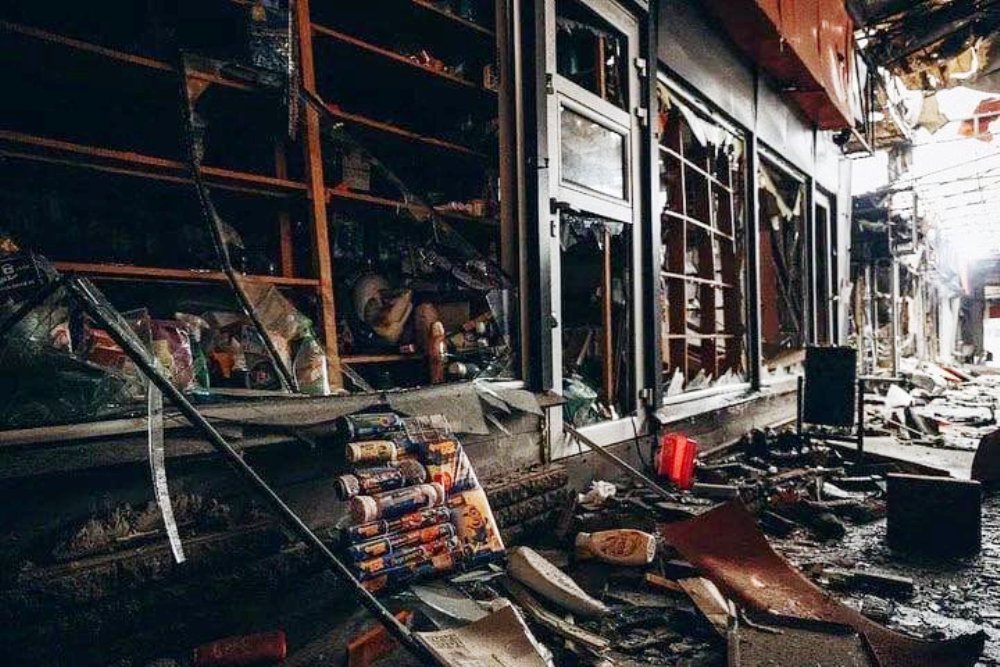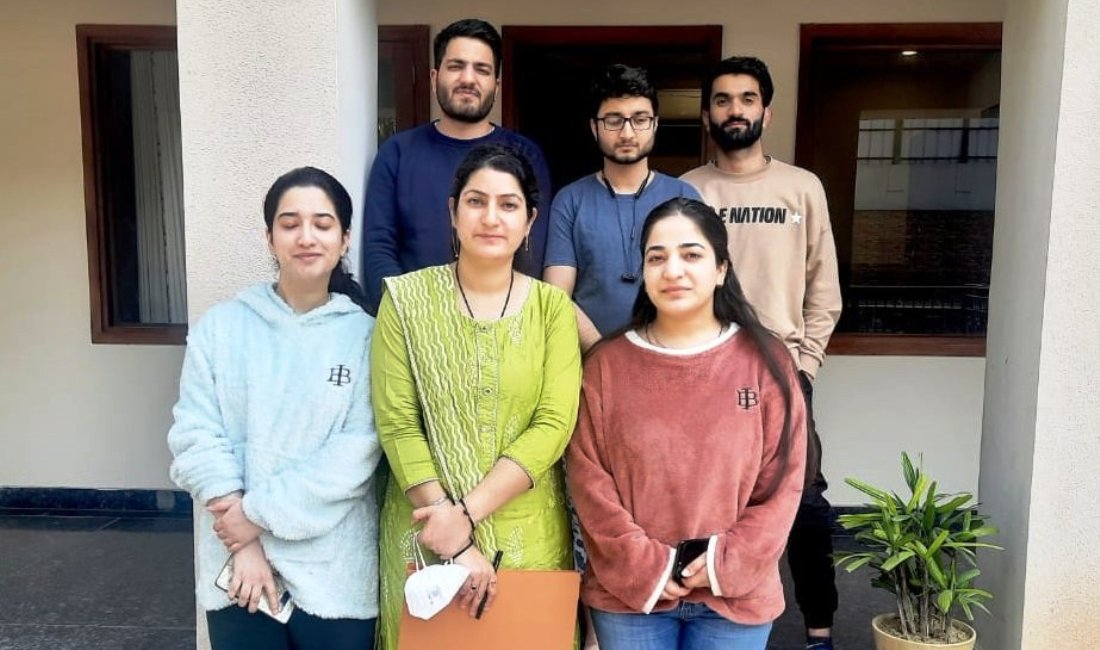As Russia finally invaded the NATO member, Ukraine, its weakest neighbour, scores of Kashmiris were caught in the medical campuses. While efforts are underway to evacuate them, Syed Samreen talked to a few who took the land route to flee the war theatre

No one in Kashmir would have ever imagined that its people would get caught in the Russo-Ukrainian War, more than 4000 kilometres away, a situation simmering since 2014 but recently blurted out on February 24. Kashmiri students studying medicine in the top Ukrainian colleges were stuck in the capital city of Kyiv and Kharkiv towards the east of Ukraine and other adjoining areas in its west, witnessing the unrest and chaos that unfolded after the invasion.
While witnessing this major historical event, which runs the risk of triggering World War 3, the students feared for their lives and constantly reminded the authorities back home to evacuate them from the war theatre. On the day Russia started its attack, some students updated their situation on social media. One of them told a local news channel back home on February 24: ‘No need to Panic, the situation is normal so far.’
As days passed, the tensions surged. A sense of helplessness grew among the students as well as their parents back home. Some desperate parents in Jammu moved out on the streets to seek official help.

Spade Work
Nasir Khuehami, a student activist, drafted an SOS and posted it on Twitter. Shortly after, the document landed at Raj Bhawan with all the details of the students. Along with his friends, who run an organisation, five helpline numbers for students and their families were established. The following day, toll-free numbers were added for parents.
“Early in the morning, on February 24, I started receiving calls from multiple people about the invasion and the unrest in Ukraine,” Khuehami said. “After the helpline numbers were issued, the phones started blaring with students and parents submitting all their details and hoping of an evacuation.”
Since then, Khuehami said they are in direct and continuous communication with the Lieutenant governor’s office and the MEA.
Besides, Khuehami’s group coordinated with three people in Moldova, two from Kashmir and one from Karnataka. These colleagues of the association, Khuehami said, are assisting the students by informing them about safer routes from Ukraine, to its exterior, train timings and the others safety measures in and around other regions and borders.
Students started arriving in batches of two, four, five and thirteen on different flights starting February 24. However, some students are still stuck in other countries bordering Ukraine through which they can travel to Delhi via a flight, with the help of the embassies in the respective countries.
Through Slovakia
Adnan Nawaz Choudhary, 23, studies in the Vinnitsiya national medical university, Vinnitsiya Ukraine, is now sitting in the four walls of his Sunjwan house in Jammu. Vinnitsiya city lies towards west-central Ukraine. Even though Vinnitsiya is at a distance from Kyiv and Kharkiv, the centre of the Russo-Ukrainian confrontation, Adnan said they left the city in a state of fright without seeking help from the embassy.
The day the war began, Adnan said they contacted the Ukrainian consultants who had helped them in selecting a college at the time of admission but received a cold, rather disturbing response from them. “Leave on your own responsibility,” he said they were told.
Two days later, Adnan and twenty others embarked on a journey to their homeland. There were students from all over India in his group and not just from Jammu and Kashmir.
“We arranged three busses which were scheduled to pick us up at 5 pm and 9 pm respectively. We would all fit in just one bus but we weren’t sure of the drivers’ reaction when told that we had to reach the Slovakian border,” Choudhary said. “It was the most expensive bus travel for us as we had to pay almost one lakh rupees for it. The bus which was scheduled for 5 pm reached to us late, at around 8 pm.”
The students didn’t carry any luggage with them. Instead, they carried all the important documents, one pair of clothing and some food. The 20-hour journey would take them to Uzhhorod on the Slovakia border, almost 500 km away.
“We walked for some minutes towards the border and witnessed a large number of people from Nigeria, Arab and the United Kingdom. We were not allowed to enter Slovakia. We arranged contact numbers of the embassy in Slovakia and finally, an official informed the Ukrainian forces at the border to let us in the Slovakian territory,” Choudhary said.
After a three-day stay in a hotel in Slovakia, Kiren Rijiju, the Minister of Law and Justice of India came to rescue the students in a SpiceJet aircraft.
“When I reached back home, via a Delhi-Jammu flight, I saw my family crying and in utter pain. They couldn’t believe that I had finally landed. My maternal uncle came from Kashmir to see me,” he said.
Through Poland
Asif Mir of Qazigund Anantnag was far away from the bombing sites, but right in the middle of Kharkiv. A senior student of Kharkiv Medical University, he was one of those students who witnessed the blasts and the heavy shelling.
“I saw everything. I witnessed everything. I could see buildings burning down from afar and smoke all over. There was utter panic among us. The smoke was dense and all over the ground,” he said, almost crying. “If we would panic and act hysterical, there was no way our juniors would hold back and be calm. As seniors, we had a responsibility to act wisely and reassure them that things were going to be alright.”
Mir and his companions sought shelter in the basement of a metro station for three days. Later, they sought shelter in the basements of the flats, they were living in.
During these days of horror and fright, Mir said that they were reluctant to go out and buy groceries but had no option for survival. “We could have been shot in the crossfire the same way in which Naveen Shekharappa was shot at by Russian forces while standing in a queue for groceries. While shopping we used to sit down and crawl our way out.’ Mir said.
On February 28, they escaped and reached the Railway station. “We didn’t know where the train was going. We just boarded it and let it carry us to whichever place it was going to.” The train dropped off the students to Lviv city. From there, they booked a cab and reached the Ukraine-Poland border. It took eight hours on the border to complete the documentation process. “Later, the Indian embassy sent a bus for us from Poland and we hopped on. It dropped us at a hotel, where we are staying right now,” Mir said, hoping to reach Delhi.
Through Romania
Another student Farhan Ahmad (name changed) studies Medicine in Kyiv. “One fine morning, out of nowhere we got to hear that the airport had been attacked and all flights were cancelled,” Ahmad said.
They were frightened as Kyiv is the origin of the confrontation. “Whenever the sirens rang, all of us stood up robotically and ran towards the shelters. There were piercing sounds that hurt our ears,” he said. “Everything was visible to us from the top floors of our buildings. One had to gather enough courage to look at the horrifying sight of the blasts and heavy shelling.”
On February 26, the students took a train to the Romanian border. “There were rumours that there was bloodshed on the borders but it was untrue. Things were calm and under control,” Ahmad said. In that group, two were Kashmiris. They plan to fly to Delhi on March 4.
“The hospitality that we received from the Romanian people was unmatched. They set up food stalls, provided us with SIM cards, money, water and shelter,” a grateful Ahmad said. Romanians told the students: “We are a little town. Whatever we are providing you is from our own pockets. All the food stalls, shelter and money are from our pockets, not the government. It is our duty to be there for you all.”
A common thread that connected all Kashmiri stories from Ukraine is that they stood strong. “We stood strong. Others used to shout and cry while witnessing the terror,” was the common refrain.
Post Script
A smart estimate is that around 200 students from Jammu and Kashmir are enrolled in medical schools across Ukraine. Not even one-fourth of them have flown home. As the war is getting murky and deadly, efforts are underway to get them home at the earliest.















